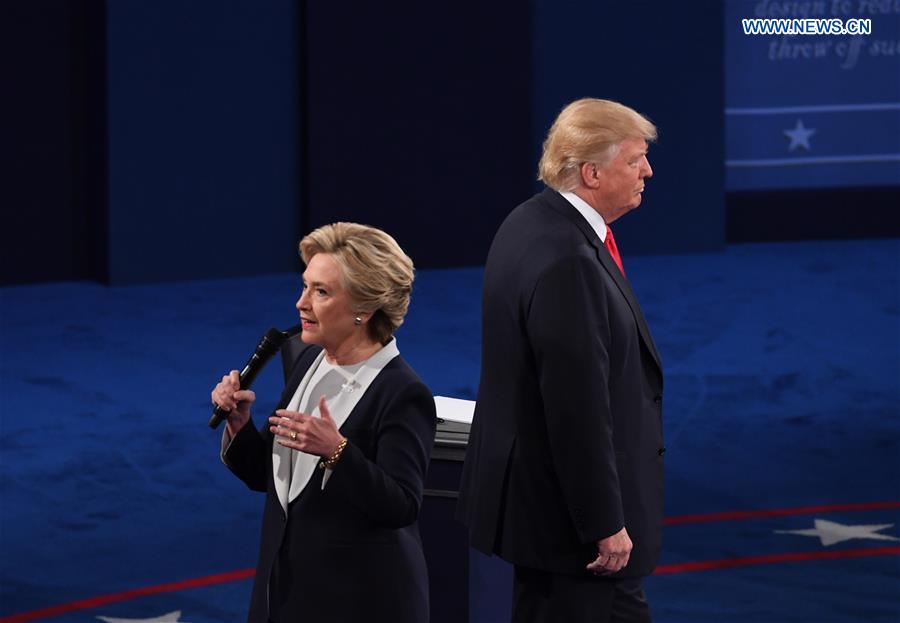Trump and Clinton: their stances on China
- By Jesse Anderson
 0 Comment(s)
0 Comment(s) Print
Print E-mail China.org.cn, November 2, 2016
E-mail China.org.cn, November 2, 2016
|
|
| Democratic presidential candidate Hillary Clinton (L) speaks during the second presidential debate with Republican presidential candidate Donald Trump at Washington University in St. Louis, the United States, on Oct. 9, 2016. (Xinhua/Yin Bogu) |
The American presidential election is watched and followed by the world at large more than any other national election. This should come as no revelation – the U.S., after all, is the world's largest economy, has the world's highest military expenditure, and arguably affects geopolitics more than any other country. A change in the White House inevitably means a change in the global political landscape.
As the world's second largest economy – and with a continually expanding international influence often at odds with American policy – China naturally has a more than passing interest in the outcome of this year's election.
In a poll carried out by Global Times, a prominent Chinese newspaper, asking readers if they would vote for Hillary Clinton or Donald Trump, 54 percent of respondents answered Trump. That's not a terribly impressive margin of victory, and a closer look at Clinton and Trump's respective policies may show why the Chinese public views the two candidates with such ambivalence.
Most commentators agree that, no matter who wins, America's stance towards China is going to get tougher. Compared to the proposals being put forth by two candidates, outgoing President Obama's approach to Beijing has been relatively conciliatory on most political and economic issues.
However, although they may generally agree on taking a stronger stand against China, the two candidates have different ways of going about it, leaving no clear answer as to who would be better – or worse – for Chinese interests.
On security issues, Trump's policies seem much more favorable. He's espoused a clear isolationist approach to foreign policy than Clinton, and has said that U.S. allies in East Asia – specifically, Japan and South Korea – would have to take greater financial responsibility for military projects that currently receive large amounts of American funding.
Clinton, on the other hand, was deeply involved with what has come to be known as America's "pivot to Asia" during her time as Secretary of State. The "pivot" represented heightened American attention to security issues along the Asian Pacific Rim and has been seen by China as an attempt to control its growing dominance in the region.
The biggest issue, of course, is the ever-contentious South China Sea territorial dispute that has led to one of the biggest Sino-American disputes in recent years.
On trade, things aren't so cut-and-dried. Donald Trump has been much more vocal about his stance on China, going so far as to accuse it of "raping" the United States, and has proposed to implement a 45 percent tariff on Chinese imports. The current rate is 4.2 percent.
He's also pledged to label China as a currency manipulator, to fight harder against intellectual property theft in China and to force Chinese companies to follow U.S. environmental and labor standards.
The one trade issue where he might have an advantage over Clinton in Chinese eyes is the Trans-Pacific Partnership Agreement (TTP). Trump is thoroughly opposed to the deal, whereas Clinton's stance – though she has most recently stated opposition – has been somewhat inconsistent.
So, as reflected by the newspaper poll mentioned above, there's really no simple answer to which candidate would be better for China.
Clinton is more likely to be confrontational on security issues, while Trump is more likely to have a negative impact on Chinese trade. Any given Chinese citizen's preference will most likely be determined by the issues he or she deems most important.
Opinion articles reflect the views of their authors only, not necessarily those of China.org.cn.







Go to Forum >>0 Comment(s)